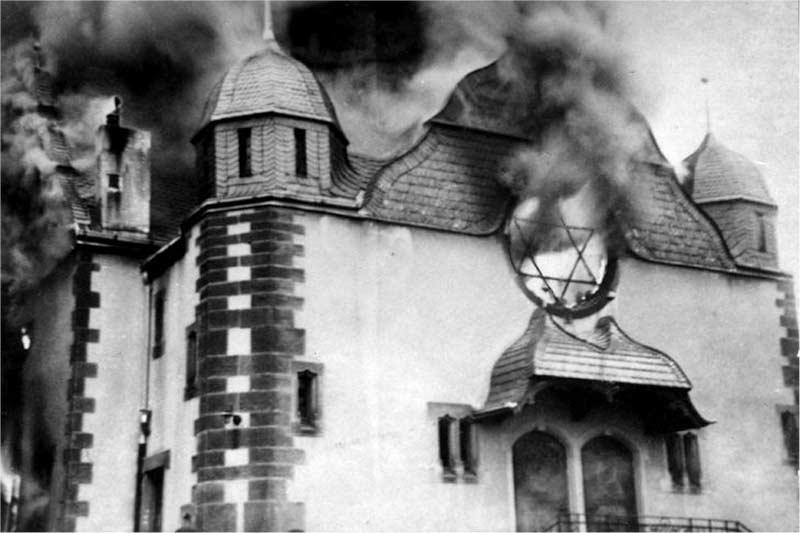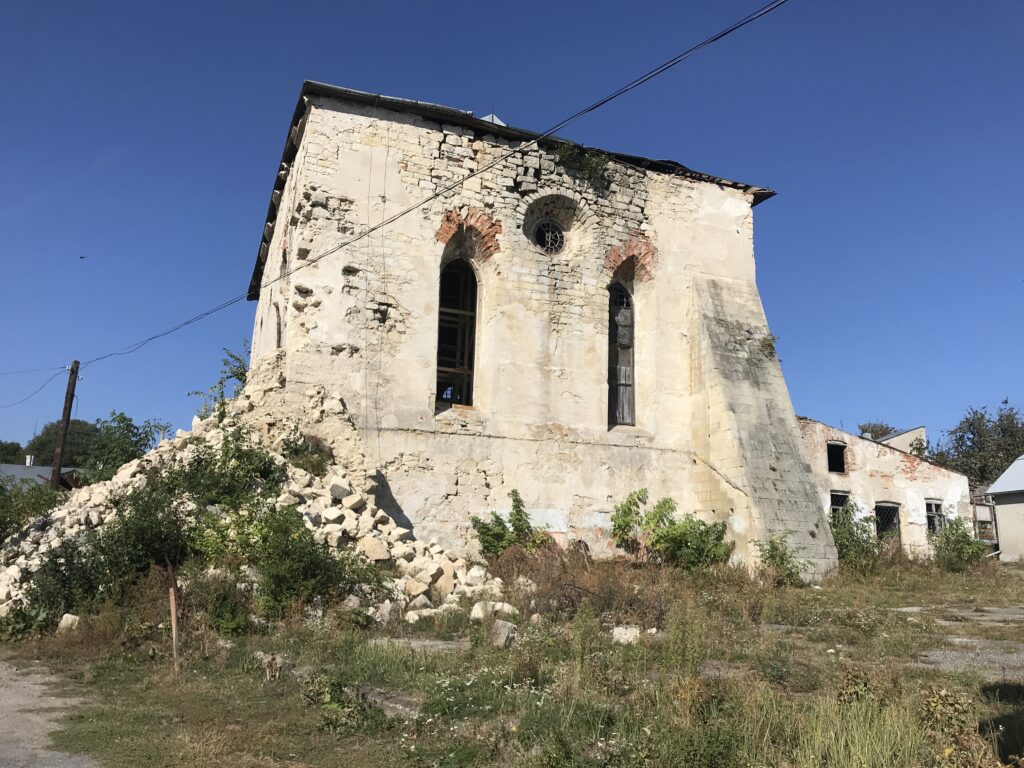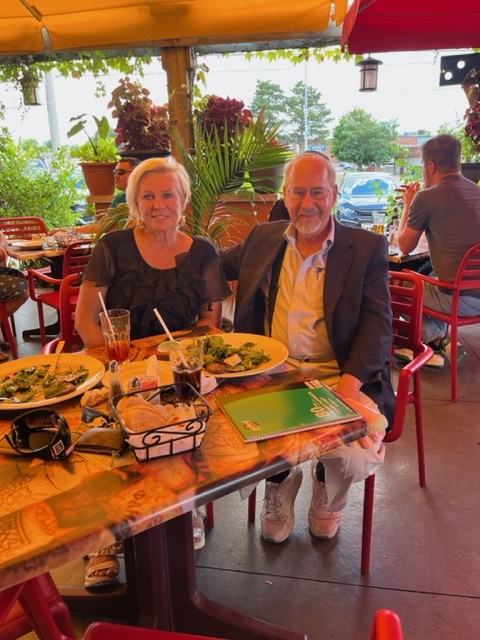
In Orange, a community pays tribute to a ‘Righteous Gentile’ from Ukraine
By Stacey Dresner
On the night of Nov. 9-10, 1938, the Nazis organized the murder of Jews and the burning of 1,400 synagogues, Jewish institutions and Jewish business in Germany and Austria in an event that became known as Kristallnacht — the Night of Broken Glass Largely considered to be one of the seminal moments that led to the Holocaust, each year this tragic and historical event is marked by houses of worship and Jewish organizations all across the world with commemorations that focus on the shared struggle against antisemitism, racism, hatred and intolerance. This year, with global antisemitism on the rise, the message of Kristallnacht is more important than ever before.
Among the many Southern New England synagogues that will commemorate Kristallnacht is Congregation Or Shalom in Orange, Connecticut, where the story of a Christian woman living in Western Ukraine who was killed as she attempted to save the lives of her Jewish neighbors will be told.
ORANGE, Connecticut – In early 1939, the town of Pidhaitsi in Western Ukraine had a population of more than 7,000, of which 60 percent was Jewish. Jews had been living peacefully alongside their Christian neighbors in Pidhaitsi since at least the 1600s.
But by the end of World War II, nearly the entire Jewish population was gone – killed in concentration camps or shot and buried in a pit near the ghetto in town in which the Jews had been forced. A small number escaped to the Ukrainian woods.
One Christian woman in Pidhaitsi, Kateryna Sikorska, a widow and mother of three young daughters had attempted to save the lives of several of her Jewish neighbors, hiding three in a hole under their kitchen floor, and working with a forger to create false identification papers so that Jewish neighbors could pass for non-Jews.
But in the end, someone turned Sikorska into the Nazis. She was imprisoned and later executed by the Germans for her actions. Today she is listed as one of the Righteous Among the Nations at Yad Vashem.
Sikorska’s story is the focus of the “Kateryna and Her Daughters,” the 16th Annual Kristallnacht commemoration presented by Congregation Or Shalom in Orange, Connecticut and the Jewish Federation of New Haven on Sunday, Nov. 13 from 9-11 a.m. via Zoom.

For the past 16 years, Rabbi Alvin Wainhaus of Or Shalom has used the Kristallnacht program in New Haven to share the stories of those who put their own lives at risk during World War II to save Jews.
“It’s a labor of love,” said the rabbi, whose own father, Rabbi Anshel Wainhaus, was among thousands of Jews rescued through a transit visa issued by Japanese diplomat Chiune Sugihara, one of the righteous gentiles honored at the New Haven commemoration.
In the past 15 years, the event has also honored a U.S. soldier who witnessed the four chaplains – a rabbi, priest and two ministers – who gave up their life jackets to soldiers and went down with the SS Dorchester in 1943; U.S. diplomat Hyram Bingham IV, who issued lifesaving visas to more than 2,000 French Jews; Polish nurse Irene Sendler who saved 2,500 Jewish children during the war; and Ruth Gruber, the journalist who on a secret mission rescued 1,000 Jews in Italy.
“We always do this on Kristallnacht. Instead of turning Kristallnacht into another Yom Hashoah [Holocaust Commemoration Day], another day of crying and mourning, I turned it on its head. People walk out uplifted because on Kristallnacht we focus on the courage and conscience of the few who rescued people like my father.
“Kristallnacht was Hitler’s way of testing the waters – ‘What will the world do?’ Well, guess what? The world was silent,” Rabbi Wainhaus said. “So when we gather on Kristallnacht, we are really undoing that legacy. We’re saying, ‘We’re not going to be silent; we are going to speak out against evil. We are going to celebrate human goodness and those who stood up against evil.
This year’s program has special significance.
“Because of the situation in Ukraine, I felt we ought to focus on the Ukrainian story. Over 2,600 Ukrainians hid Jews, saved Jews, sheltered Jews. And although some of the worst atrocities of the Holocaust took place in Ukraine, it’s really important that people know that there were some very wonderful people who risked their lives and paid the ultimate price to save Jewish people.
“So I was drawn to Ukraine because of the barbaric assault by Russia upon Ukraine. I was looking for a Ukrainian story because I wanted to bring out the humanity of the Ukrainian people. I know there were terrible things that happened there during the Holocaust, but there are some really beautiful people there and I wanted to focus on that. It’s not black and white.”
Rabbi Wainhaus found the story of Kateryna Sikorska and her daughters on the Yad Vashem website where it lists the Righteous Among the Nations – gentiles who aided Jews during the War.
“Kateryna’s story jumped out at me because she truly paid the ultimate price. She was put to death by the nazi regime in Ukraine for sheltering Jewish people. In the 16 years that we have commemorated Kristallnacht, we have yet to honor someone who was executed because of what they did.”
Iryna Korpan, Kateryna Sikorska’s granddaughter, will be the guest speaker at the Nov. 13 Kristallnacht commemoration, to be held on Zoom.
A television news reporter and producer now living in Toronto, Ontario, Canada, Korpan grew up in Pidhaitsi. While growing up in Ukraine, Korpan – whose mother Krystyna was Kateryna’s middle daughter – didn’t know the full account of what her grandmother Kateryna had done during the war.
“We were not allowed to talk about it because it was the Soviet Union and the communists have a different perspective of history on Jews and Ukrainians and all that. So my mother never actually spoke to us about it,” Korpan said. “When we asked her ‘Where is our grandmother, what happened to her?’ she would just say the Germans killed her during the war. She didn’t give any details. Once Ukraine was independent, then people started talking more freely about the history.”
Korpan had already immigrated to Toronto before Ukraine declared independence in 1991. (Toronto now has the largest Ukrainian community in Canada). Her parents Krystyna and Roman immigrated to Canada that year, and she and her mother started talking about what happened during the war.
Krystyna explained that for a year her mother hid Moishe Klar, the town photographer, and Leon and Adolf Kressel, the teenage sons of their neighbor, in a hole that had been dug under her kitchen floor boards.
Both Sikorska and Klar had been working with a forger to make false identification papers for Jews in town. Sikorska and her girls – Iryna, 14, Krystina, 12, and Maria, 9 – all acted as couriers, carrying photographs and documents between Klar and a forger in a town six kilometers away.
Sikorska also had her daughters deliver food to a hole in the fence of the town’s Jewish ghetto, hoping that no one would suspect young Ukrainian girls of aiding the Jews.
“It was a very risky enterprise,” Rabbi Wainhaus said. “These girls did what their mom said to do – help Jewish people.”
In late 1942, Kateryna was turned in by an informer. German soldiers came to her house, dug up the kitchen floor and shot all three of the Jews hiding there. Sikorska Kateryna was arrested and later shot. Her three daughters were left to fend for themselves.
“It really touched my heart and soul,” Korpan said. “Honestly, that was the first time my mother really freely talked about this and opened up, and we both cried.”
Knowing the full story, Korpan decided to use her experience as a television reporter, producer and editor for Toronto’s Omni Television to make a documentary about her grandmother.
“I said, I have this story about my family that I can tell the world. I started digging and talking to people. I traveled to Ukraine, and also connected with the Klar family.”
The result is the 2015 video “She Paid the Ultimate Price.”
In it Korpan shares her grandmother’s story and some of the history of the Jews in Pidhaitsi, and interviews Leon Klar, the son of Moshe Klar, the man that Sikorska had hidden. Leon, now a photographer living with his family in Israel, survived the war by using documents forged with the help of his father and Sikorska.
Korpan and her father Roman contacted Yad Vashem when they learned about its Names Recovery Project. (Her mother Krystyna by then had passed away. Kateryna’s youngest daughter Maria is still alive and living in Ukraine.)
Roman was able to recall and name 43 Jews from Pidhaitsi who were killed during the Holocaust – some of whom had been unknown to Yad Vashem before this – and submitted testimony. Korpan also sent a picture of her grandmother and information about her actions during the war. Kateryna Sikorska is now listed as one of the Righteous Among the Nations at Yad Vashem, along with her oldest daughter, the late Iryna. (Only people 14 and older are eligible to be named Righteous Among the Nations, despite the brave actions of Kateryna’s two younger daughters.)
Korpan has worked to have a street in Pidhaitsi renamed Sikorska Street and has also donated funds for some repairs of the town’s synagogue. She hopes to begin a fundraiser campaign to raise more money for the building’s upkeep.

“It is important because basically there were no Jews left in Pidhaitsi, even though Pidhaitsi has the oldest and biggest Jewish cemetery in Galicia,” Korpan said. “The synagogue is what is left of the memory of the Jews who lived there, and worked there and built it. So it is very important to keep this building. It is one of the oldest synagogues there, built in the 17th century.”
Kateryna has also been memorialized in “Don’t Tell the Nazis,” a young adult book written by Marsha Skrypuch, who will also be a guest at the Kristallnacht commemoration, talking about her book.
U.S. Rep. Richard Blumenthal will present a U.S. Senate certificate of special recognition to Iryna in honor of her grandmother. “And, said Rabbi Wainhaus, “we are going to offer a prayer for Ukraine.”
For more information about “Kateryna and Her Daughters,” the 16th Annual Kristallnacht Commemoration in New Haven, Connecticut, visit orshalomct.org. Register at jewishnewhaven.org/kristallnacht







 Southern New England Jewish Ledger
Southern New England Jewish Ledger












